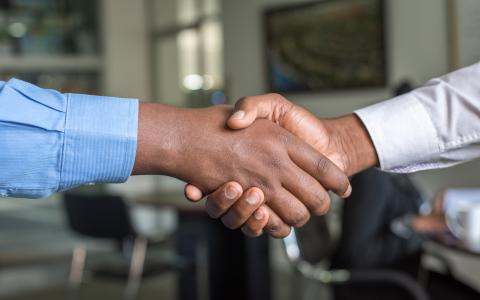
A good month before China alerted health authorities to an unknown respiratory virus spreading through Hubei province, executives from Telefonica SA in Madrid and Liberty Global Plc in Denver began to assemble an audacious merger plan.
The two communications powerhouses each owned assets in the U.K., among the most competitive markets in Europe, a region where consolidation had stumbled in recent years. Now, in mid-November, the timing seemed right to reconsider a combination of local units. Stock markets were booming, borrowing costs were near record lows, and the U.K. under Prime Minister Boris Johnson appeared to have finally cut through the tangled knot of Brexit.
Beyond the industrial logic of building a more formidable rival to BT Group Plc, executives at the companies knew each other well from years attending many of the same events, and some even working for the other side in the past. It’s these relationships that proved their worth in the opening phase of talks, which swiftly progressed to confidentiality agreements in mid-December and a first review of the accounts a few weeks later.
The personal connections provided an invaluable lubricant when negotiations took an unforeseen and complicating twist: on March 11, the two sides met near London to push the deal along. But on that same day, the World Health Organization declared the virus that had spread from China a global pandemic. The London meeting would be the last physical get-together of the negotiating teams.
Social Distancing
Suddenly, deliberations that had hummed along smoothly lurched online; gatherings at hotels, law firms or the offices of financial advisers were replaced by video calls, often more than a dozen a day that could easily stretch past midnight.
This story is an account of how Telefonica and Liberty Global pieced together a deal to create the U.K.’s largest phone and internet operator, a combination valued at 31.4 billion pounds ($39 billion). The story is based on interviews with people familiar with the negotiations, who asked not to be identified discussing confidential deliberations.
With the global economy in freefall and all bets off when a recovery might take hold, one thing nevertheless looked like a safe assumption: people needed reliable connectivity more than ever, proving the point of combining with a rival to build scale. And for Telefonica Chairman Jose Maria Alvarez-Pallete, there was a lot riding on a transformational deal. Investors were pushing for a clearer growth strategy for the debt-laden company, one that Alvarez-Pallete so far hadn’t delivered, weighing on the stock.
The Spanish executives found a willing partner in Mike Fries, the Liberty Global CEO who was looking for a way to squeeze more value from his company’s European assets. Lutz Schueler, who became Virgin Media CEO a year ago, was also a familiar face, having worked at Telefonica for a dozen years.
Dinner’s Ready
As video calls became the new normal, so did all the glitches and involuntary personal interactions, from dogs barking in the background, to executives showing up in shorts and shirt-sleeves or being summoned to the dinner table before the next marathon round of calls late into the night. Fries appeared routinely from his home located in the leafy suburbs of Denver.
Liberty Global executives made a point about not using the popular Zoom video platform, preferring instead to communicate on the WebEx product. There were also health scares on the teams that drove home the seriousness of the pandemic now raging in Western Europe. One of the members of Telefonica’s M&A team was ill with the coronavirus and was confined to a room within his house but still worked on the deal. An adviser to the companies also contracted the disease.
At the same time, the personal and economic dislocations wrought by the virus focused the minds of both sides to see the deal through and unlock the value and savings that would come from the transaction.
Telefonica Chairman Alvarez-Pallete was particularly keen not to let this opportunity slip from his hands. Ever since he had broached the idea at a board meeting in November, he remained nervous that Liberty would not follow through. After all, John Malone, Liberty’s billionaire chairman, is a consummate dealmaker and shrewd negotiator, and Alvarez-Pallete was anxious about disruptive leaks or an interloper crashing his party.
Human Touch
On May 1, news of the negotiations nevertheless slipped into the open, when Bloomberg News first reported that the two companies were considering combining their U.K. units. But by then, the deal was on its home stretch -- after weeks of meetings and a stream of virtual sessions. As the codename for the transaction, Telefonica had chosen “Hawaii,” while Liberty Global picked “Pink,” a play on blending the colors of the two corporate emblems: blue for Telefonica’s O2 and red for Liberty Global’s Virgin.
In the early hours of May 7, a definitive agreement had been struck. The companies announced the merger of the assets hours later, complete with a slick web page and videos of both leaders that laid out the benefits of reliable communications services in the age of Covid-19. Shares of both companies rose on the news.
With governments only starting to loosen stringent lockdown rules, there were no traditional M&A celebration dinners with champagne.
Speaking on a call with reporters to discuss the transaction, Alvarez-Pallete lauded the human touch that led to his company’s biggest-ever transaction and allowed both sides to overcome the limitations of remote meetings.
“Having built relationships of trust helped us get that degree of human relationship that the screen takes away,” Alvarez-Pallete said. “This would not have been the same if we hadn’t known each other.”
This article originally appeared on Bloomberg.



